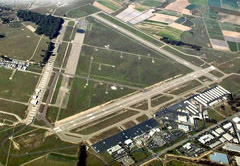 SM Airport sweetens incentives for carrier – Board approves $1 million in support package
SM Airport sweetens incentives for carrier – Board approves $1 million in support package
The Santa Maria Public Airport is upping its ante in the game to land commercial passenger service to a Midwest hub.
The airport has enhanced its Airlines Support Program in hope of enticing a carrier to land here. A combination of rent, landing fee and fuel flowage waivers creates approximately $1 million in incentives to prospective airlines.
Nearly half of that increase — $400,000 — is a revenue guarantee, which increases the airport’s commitment to $510,000. That money, combined with the airport’s Small Community Air Service Development Program grant, puts Santa Maria’s revenue guarantee at an even $1 million.
The airport is also committing another $55,000 increase in marketing and advertising support, which raises that total package to $100,000.
The board of directors Thursday unanimously approved the move in a 3-0 vote. Directors Chuck Damiano and David Baskett weren’t at the meeting, but expressed their support for the move.
“It’s a seven-figure number, so it’s a much bigger amount,” airport General Manager Chris Hastert said of the increased support package. “It shows we’re very committed, as well.”
The airport has been working toward getting either United, Skywest or another carrier to provide service that would open a gateway east for its customers.
Landing the Federal Aviation Administration small community development grant a year ago was a big step. Hastert said using it to increase the airport’s incentive package is what air service development is all about.
In addition to sweetening its incentives, representatives of the airport have met with airlines several times over the past year. Hastert and Director Carl Engel Jr. visited United Airlines headquarters in Chicago, Hastert visited Skywest headquarters in St. George, Utah, and Hastert and Director Chuck Adams met with those airlines and others at a pair of air service conventions.
“Basically it’s kind of like speed-dating with the airlines,” Hastert said of the conventions. Airport representatives get 20- or 30-minute meetings with airline representatives to make their sales pitch. However, many of the airlines aren’t listening too intently to ideas about increasing service.
Trina Froehlich, of Mead & Hunt, which provides planning services to the airport, told the board Thursday that the county’s airline industry isn’t exactly healthy and ready to expand.
Froehlich’s presentation showed that after the 9/11 attacks airlines have lost billions, with 23 U.S. carriers either declaring bankruptcy or going out of business.
Major carriers such as Continental, Northwest and America West have merged with other large carriers leaving just five major U.S. airlines. American Airlines’ proposed merger with US Airways could drop that number to just four domestic carriers.
The consolidation leaves the big airlines focusing their efforts on large markets, leaving smaller airports like Santa Maria, out of the mainstream. There are 50 percent fewer regional carriers than just 15 years ago.
The airlines that are left are also operating larger aircraft. The average size aircraft currently operating are 56-seaters, an increase over the 30-seat planes flying 15 years ago. That trend looks to continue.
According to Froehlich, there are no current orders for new aircraft with less than 70 seats, and the current crop of turboprop and smaller regional jets is aging rapidly.
“We’re very fortunate Skywest is still flying the Brasilias,” Hastert said of the 30-seat planes that fly for United Express. The smaller planes account for 27 weekly flights into and out of Santa Maria, all to Los Angeles.
Even though the skies aren’t exactly clear for the airlines industry, Hastert said they will continue their effort to develop an eastern route.
“The research we’ve done shows the route would be profitable,” he said. “The airline industry is not focused on small markets right now. It’s an uphill battle.”
Hastert said the airport would continue to work with the Santa Maria Valley Chamber of Commerce, the Economic Development Commission and local businesses and industries to make the market more attractive. For now, though, he said the enhanced support package is a “bigger tool in our tool box.”
